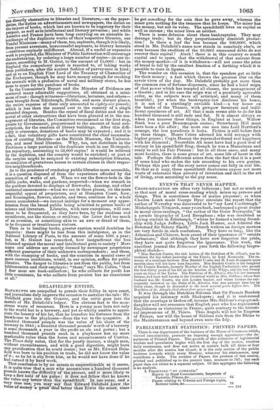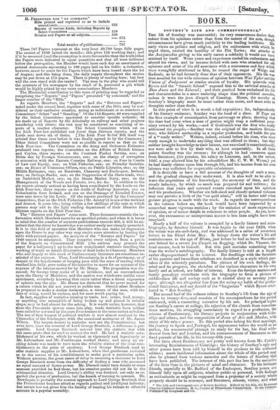PARLIAMENTARY STATISTICS: PRINTED PAPERS.
There is one department of the business of the House of Commons which, viewed cumulatively, presents an imposing enough appearance—the de- partment of Printed Papers. The growth of this collection of legislatorial wisdom and speculation begins with the first day of the session, receives daily sustenance, and does not arrive at mature bulk till three or four months after the session has closed: it is the only section of the public business towards which every Member, whatever his attainments, may contribute a little. The number of Papers, the produce of last session printed and published up to the present time, amounts to 787; but each paper does not relate to a separate subject. Of this aggregate the following is an analysis. 1. PRESENTED BY COMMAND." Reports by Royal Commissioners, Inspectors of Factories, Prisons, &c 44 Papers relating to Colonial and Foreign topics,
Revenue tables, &c 70
— 114 IL PRESENTED NOT " BY COMMAND."
Bills printed and reprinted so as to include amendments 223 Reports of various kinds, including Reports by Select Committees 110.
Returns and Papers on all subjects.. ........ 840
— 673 Total number of publications 782
These 787 Papers represent at the very least 29,700 large folio pages. The session of 1849 lasted six months:, this gives 156 working days; and if it be assumed (and the assumption is more favourable than the truth) that the Papers were delivered in equal quantities and that all were delivered before the prorogation, the Member would have each day an assortment of printed documents amounting to 190 pages laid on his table: a deduction, however, must be made for the Papets which have been issued since the 1st of August; and this being done, the daily supply throughout the session may be put down at 170 pages. There is plenty of reading here; but how will the case stand with the reader? The man in the play who could tell the contents of his newspaper by the smell of it, possessed a gift which would be highly prized by our more conscientious Members.
The Ministerial contribution to this mass of printing may be regarded as comprising the " Reports" and "Papers" presented " by command," and the larger number of the "Bills."
As regards Members, the " Reports " and the "Returns and Papers," noted under the second head, together with some of the Bills, may be con- sidered as their exclusive creation, acting as individuals or as members of Committees" Select " and " Standing." Of the 110 Reports, 40 were supplied by the Select Committees appointed to consider specific 'subjects; 32 are made up of Reports by the Admiralty on railway and other projects interfering with rivers; the rest may be considered as consisting of re- ports of a routine character. The Select Committee which sat on the Irish Poor-law published not fewer than thirteen reports, and the Lords sent down six of theirs. [The Irish Poor Relief Bill itself was printed four times over before it was finally agreed to by the Commons.] Other Select Committees were not so prolific in reports as that on the Irish Poor-law. The Committee on the Army and Ordnance Estimates produced two reports; the Committee on the Affairs of British Guiana and Ceylon, three reports; on the Contract Packet Service, one; on Debts due by Foreign Governments, one; on the charge of corruption in connexion with the Eastern Counties Railway, one; on Fees in Courts of Law and Equity, one; on Irish Fisheries, one; on Friendly Societies, one; on House of Commons Offices, one; on Public Libraries, one; on the Militia Estimates, one; on Receivers, Chancery and Exchequer, Ireland, two; on Savings-Banks, one; on the Suppression of the Slave-trade, two; on Smithfield Market, one; on the Steam Marine Navy, one; on the Management of the Woods and Forests, two, &c. &c. In addition to the six reports already noticed as having been contributed by the Lords on the Irish Poor-law, three reports on the Audit of Railway Accounts, one on Colonization from Ireland, and one on the Drainage of Entailed Estates, were sent down by the Lords. Of the reports produced by the Commons' Committees, that on the Irish Fisheries (Mr. Anstey's) is one of the bulkiest and dearest. It costs lie.; being within a few shillings of the sum at which persons may add to the light reading department of their libraries the thirteen reports on the Irish Poor-law.
The " Returns and Papers" come next. These documents contain the in- formation which Members movafor on specified points; and when it is borne in mind that the number of separate publications exceeds 300, it will be ad- mitted that the thirst for knowledge was neither easily nor cheaply quenched. It is in this field of operation that Members who can make no impression upon the House in any other way may excite some attention by loading the table with printed papers. An analysis of the "Returns and Papers" for 1849 cannot be attempted. They comprise every subject, from a précis of the Reports on Concentrated Milk (the curious may procure the paper for a halfpenny) up to the most complicated statistics touching the working of trade or details illustrative of dead locks in Chancery. Members who add largely to this stock of Parliamentary literature are sometimes re- minded of the expense. Thus, Lord Drumlanrig, in a fit of parsimony, or of despair at the hopelessness of keeping pace with the mass of reading which reached him daily, gave notice of his intention to move for an account of the expense of the returns moved for by Mr. Hume. The proposition was dis- cussed; Sir George Grey spoke of it as invidious, and an encroachment upon the liberty of Members; and the motion was withdrawn amidst some merriment, everybody knowing that satire rather than a direct expression of opinion was the aim. Mr. Hume has declared that he never moved for a return which he did not convert to public use. Should other Members be prepared to make a similar declaration, a return of the uses, with the date of using, would be curious, and for once worth paying for.
In fact, supplies of statistics relating to trade, law, crime, food, money, or anything else susceptible of being broken up and placed in tabular shape, may be had almost for the asking. It is worth notice, however, that since the Free-trade system came into play, trade statistics have neither been called for nor used by the pure Free-traders to the same extent as before. The use of that weapon of political warfare is now almost confined to the Chancellor of the Exchequer, with the occasional assistance of Mr. James Wilson. The largest dealers in statistics now are the Protectionists; but even here, since the removal of Lord George Bentinck, a difference is per- ceptible. Lord George Bentinck entered into the statistic war with the same gusto that he used to contest the turf. He had a statistic esta- blishment of his own, which be worked as vigorously and ingeniously as Mr. Labonchere and Mr. FonbLenque worked theirs; and many an ex- citing debate was made to turn upon the relative claims of the rival esta- blishments to the palm of accuracy. Lord George Bentinck used to offer statistic supplies to Mr. Labouchere, when that gentleman hesitated as to the means of his establishment to make good a particular order. Without question, the great cause of delay in assuming a successor to Lord George Bernina:arose from the difficulty of finding a man who possessed an equal amount of figure-power. Mr. Disraeli could turn details to some account provided he had them, but his creative genius did not lie in the arithmetical direction. Lord Granby's ability was doubted, net only as re- garded the power of production, but the knack of turning to account: Mr. Newdegate is probably the nearest approach to Lord George Bentinck that the Protectionist benches afford as regards patient and intelligent industry; but nature has not gives him the faculty of turning his talents to effective account in a popular assembly.



























 Previous page
Previous page